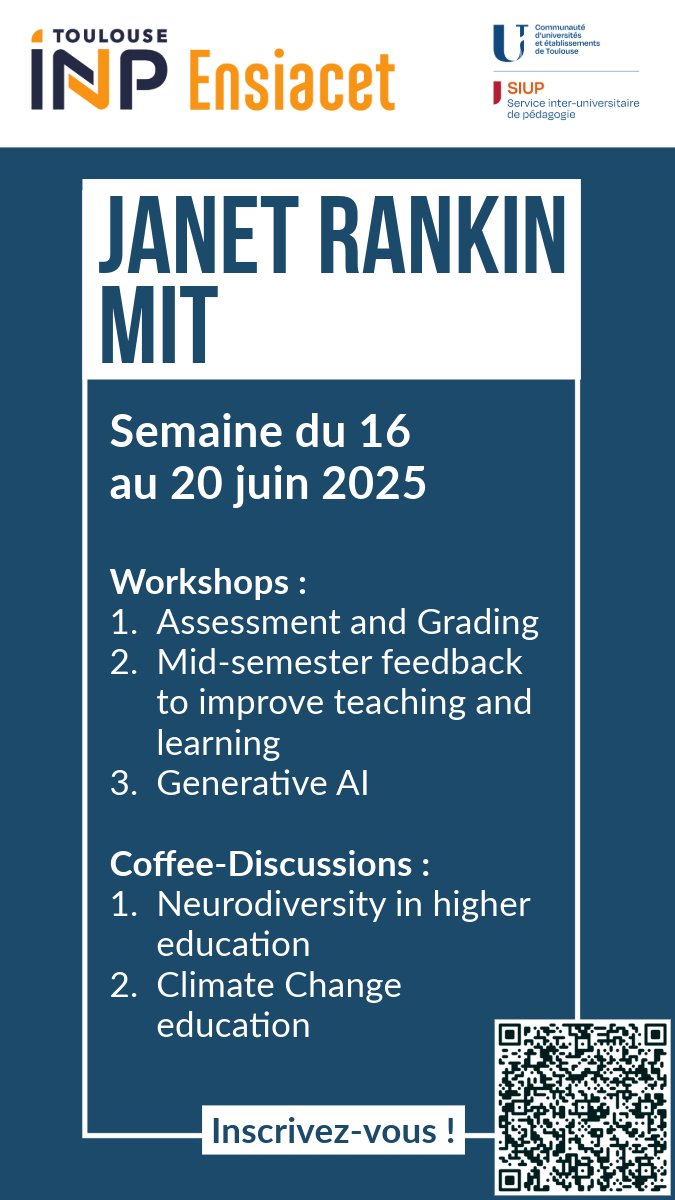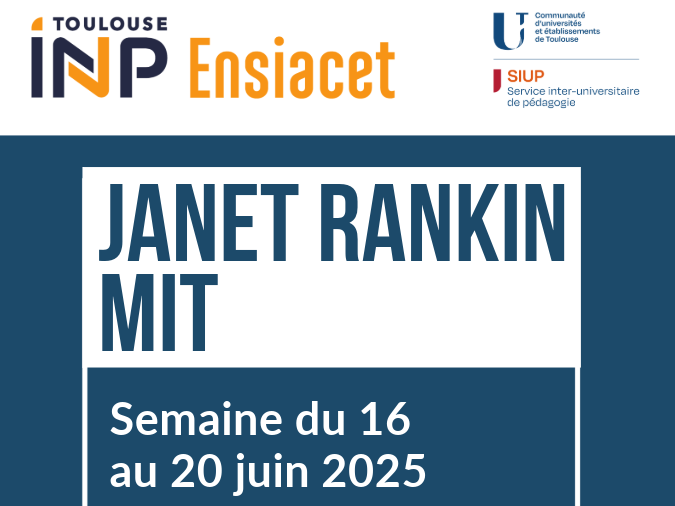Titre
Du 16 au 20 juin 2025 : Workshops avec Janet Rankin, Directrice du teaching and Learning Lab du Massachusetts Institute of Technology de Cambridge (USA)
Toulouse-INP et le SIUP de la Comue de Toulouse accueillent la semaine du 16 juin 2025 Janet Rankin directrice du Teaching and Learning Lab du Massachusetts Institute of Technology de Cambridge (USA).
Présentation de Janet Rankin:
 En tant que directrice du Teaching and Learning Lab du MIT, Janet Rankin travaille avec la communauté éducative, les départements et l'administration pour soutenir l'enseignement et l'apprentissage au MIT. Elle s'intéresse notamment à la mise en œuvre de pratiques d'enseignement fondées sur des données probantes, à l'apprentissage et à l'enseignement interdisciplinaires, à l'IA générative dans l'enseignement et l'apprentissage, aux stratégies de notation alternatives, au développement professionnel des assistants d'enseignement et au soutien des efforts visant à améliorer l'expérience de la première année d'études.
En tant que directrice du Teaching and Learning Lab du MIT, Janet Rankin travaille avec la communauté éducative, les départements et l'administration pour soutenir l'enseignement et l'apprentissage au MIT. Elle s'intéresse notamment à la mise en œuvre de pratiques d'enseignement fondées sur des données probantes, à l'apprentissage et à l'enseignement interdisciplinaires, à l'IA générative dans l'enseignement et l'apprentissage, aux stratégies de notation alternatives, au développement professionnel des assistants d'enseignement et au soutien des efforts visant à améliorer l'expérience de la première année d'études.
(Dr. Rankin received her Sc.B. in Engineering from Brown University, and her her Ph.D. in Materials Science and Engineering from MIT. She was a staff scientist at Oak Ridge National Lab, and held a faculty position Materials Science at Brown University. She has worked in Teaching and Learning since 1998.)
Dans ce cadre, 3 ateliers de formation (Assessment and Grading, Mid-semester feedback to improve teaching and learning and, Generative AI) et deux temps d’échanges informels, autour d’un café, (d’une part sur l’éducation au changement climatique, d’autre part sur la neurodiversité), vous sont proposés.
Ils se tiennent tous à l’INP-ENSIACET[1] ou à l'espace Alchimie de la MRV[2] et sont en anglais.
Vous trouverez ci-dessous le planning et le descriptif des ateliers qui sont gratuits mais nécessitent une inscription, et pour certains ateliers un travail amont.
[1] Accéder à l’INP-ENSIACET, 4 allée E. Monso 31030 Toulouse. Métro B station Ramonville, puis bus 79 Labège Couderc, descendre à INPT ; https://www.ensiacet.fr/visite360/visite_virtuelle_inp_ensiacet.html
[2] La Maison de la Recherche et de la Valorisation est située sur le campus de l’Université de Toulouse, 75 Cr des Sciences, 31400 Toulouse. Accès par le métro B – Faculté de Pharmacie. L’espace Alchimie se trouve au centre de la cour intérieure. Voir sur la carte.
📅 Programme de la semaine
|
Date |
Matin | Après-midi |
|---|---|---|
| Lundi 16 juin |
Coffee-Discussion about Neurodiversity in higher education With Jeanne Piccardi and Alexia Armand - Atypie Friendly 🕒 16h-17h |
|
| Mardi 17 juin |
Workshop-Assessment and Grading 🕒 10h30-12h00 - |
|
| Mercredi 18 juin |
Workshop-Generative AI 🕒 14h-16h |
|
| Jeudi 19 juin |
|
Coffee-Discussion about Climate Change education With Naila Even - INP Toulouse - Co-responsable du Diplôme d'Université Approches Pédagogiques Interdisciplinaires pour enseigner les Transitions Écologiques et Sociétales (APITES) de la Comue de Toulouse 🕒 14h-15h |
| Vendredi 20 juin |
Workshop -Midsemester Feedback 🕒 10h30-12h00 |
|
Les ateliers sont limités à 26 participants.
Inscrivez-vous via ce lien : https://evento.renater.fr/survey/venue-de-janet-rankin-inscription-aux-differents-ateliers-et-temps-d-echanges-cafe-w4es6669
(Merci de vous désinscrire en cas d'empêchement ou de nous contacter à siup@univ-toulouse.fr)
Description des ateliers
Assessment and Grading
What is the purpose of grades in higher education? Are grades accurate measures of how much students have learned? Do they motivate or impede student learning? What are the affordances and drawbacks of normative grading (grading on a curve) - and why is it so prevalent in higher education in the US? Participants in this workshop will discuss these and other grading-related questions with the goal of being able to select grading systems and strategies that best support their course material, philosophies, student demographics and that are consistent with potential departmental and/or institutional constraints.
Pre-workshop assignment
- Read: Schinske and Tanner (2014) Teaching More by Grading Less (or Differently) [Provides context for grading in the US]
- Read: 20 small starts for alternative grading, Robert Talbert
- Consider: times as a learner when grades were particularly motivating and/or de-motivating. Be prepared to discuss in class.
Optional reading
- Anything in Robert Talbert’s & David Clark’s terrific blog: Grading for Growth, In particular:
- Traditional grades are (still) not mathematically valid, David Clark
- When alternate grading goes (almost) wrong Guilia Toti
- Case study in Grading for Growth (Talbert & Clark): Kay C Dee's specifications-graded biomedical engineering course Rose-Holman Inst. of Tech.
- C.H. Arnaud (2021) How an alternative grading system is improving student learning
Mid-semester feedback to improve teaching and learning
The collection of mid-semester formative feedback from students is an extremely effective way to gain targeted and specific information from students about what factors are supporting or hindering their learning.
- Mid-semester feedback is intended solely for the instructor to improve student learning.
- Instructors can make decisions about potential changes to the subject in response to the student feedback.
- Providing feedback to instructors prompts students to reflect on their learning in the subject and consider how their behaviors in the class are impacting the learning process.
In this workshop we will discuss ways to collect targeted and actionable feedback in a variety of teaching contexts. (large and small classes, labs, introductory and advanced classes)
Generative AI- Come with your computer
Generative AI is here - and is likely to play a larger and larger role in higher education.
In this workshop we will use the Backward Design framework to (re)design and deliver courses that effectively leverage the affordances while mitigating the threats of GenAI. In particular, you will:
- Engage with GenAI tools
- Refine your goals for learning
- Rethink your assignments & assessments
- Consider alternate subject formats and learning experiences
- Build in equity, accessibility and student privacy
- Articulate your expectations wrt the acceptable use of GAI
Pre-workshop Readings/Assignment
- Watch: Getting Started with AI-Enhanced Teaching: A Practical Guide for Instructors (~10 min. video)
- Read:
- AI didn't make homework ineffective, by Josh Brake
- If you will be teaching writing-intensive courses - please browse this doc for resources related to GAI and writing. IMO - Marc Watkins & Jane Rosenzweig are writing some great stuff about GAI and writing
- Optional Reading/Listening:
- If you are completely new to generative AI (GAI) and large language models - I suggest this video (optional):
- GAI Basics: a Technical Primer - MT Sloan Prof. Rama Ramakrishnan, MIT Sloan (Video); part of Sloan Technology Services AI hub
- AND: If you want a laugh or a cry - listen to the FA2024 KTCP Syllabus as a Gemini NotebookLM-generated Podcast
- Please browse these articles on bias & the environmental impact of GAI (the first & second articles are good places to start. In addition, there are many other resources and sections in this doc that may be of interest to you.
Complete the following activities:
- Consider a prompt for a student assignment in a course that you are likely to teach in the near future.
- Articulate:
- Why does this assignment make sense for this course?
- What are specific learning outcomes associated with this assignment?
- Articulate:
- Create or Access an GAI account:
- Enter the prompt from the assignment or question you investigating, and consider the AI’s response:
- How did GAI do?
- What aspects of GAI’s response are accurate, reasonable?
- What aspects are incorrect or incomplete?
- Are students likely to be able to evaluate the quality of the response?
- How might AI undercut the goals of this assignment?
- Do you need to change the assignment? Do you need to change your ILOs? You may wish to use the Backward Design framework to guide your thinking.
Please come to the workshop ready to discuss your pre class assignment.




